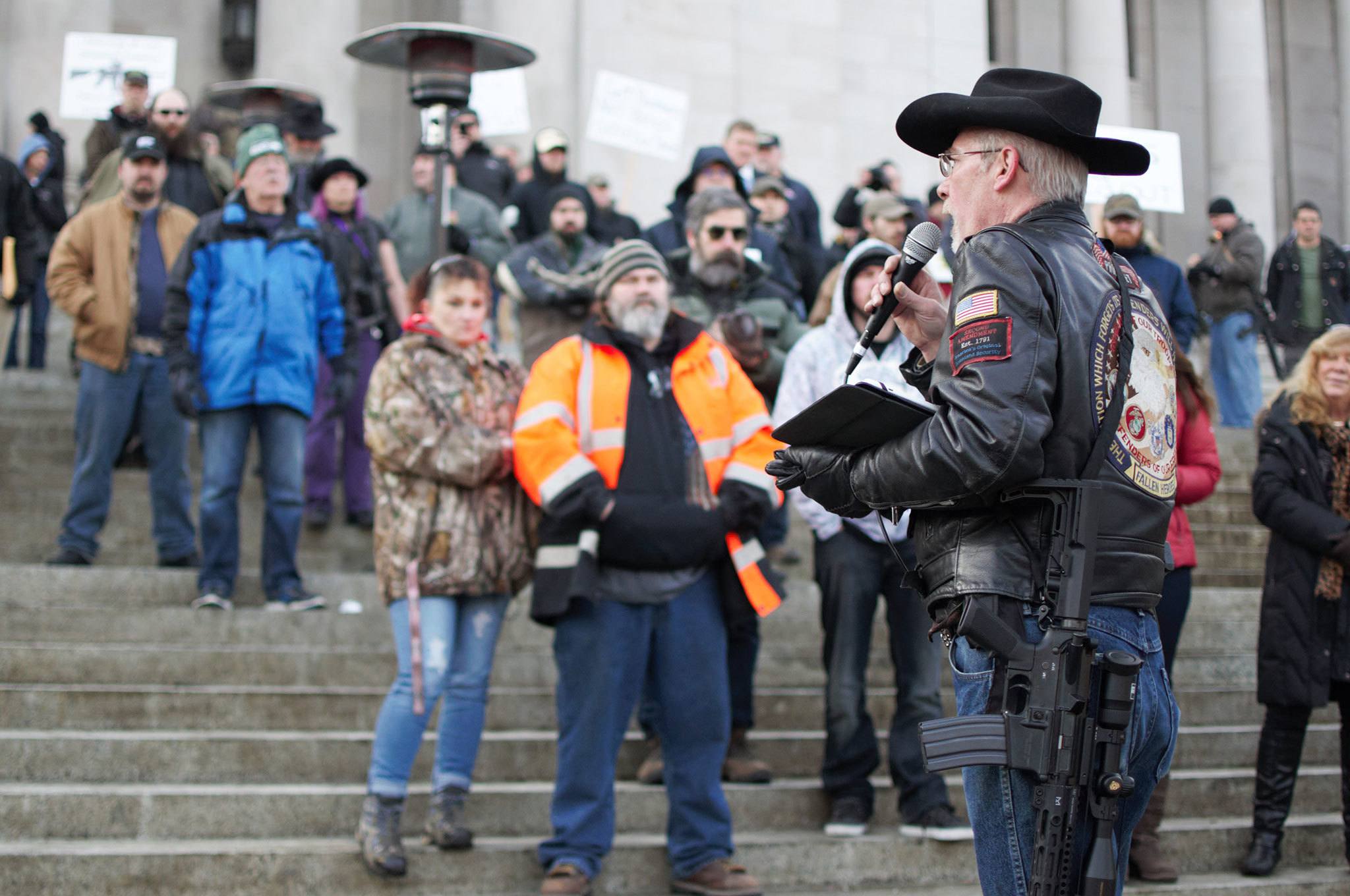By Enrique Pérez de la Rosa/WNPA Olympia News Bureau
After the heavily backed and massively popular ballot measure, Initiative 1491, passed with 69 percent of the popular vote in Washington last November, lawmakers in Olympia have proposed legislation to protect gun rights from further restrictions.
The initiative has not significantly changed the type of legislation introduced this session, according to Rick Halle, national coordinator for the Gun Rights Coalition, but he believes it sets a precedent for future restrictions sought by gun-control groups in Washington State.
“They might be more empowered to shoot for initiatives,” Halle said of a possible future strategy, instead of relying on legislated limits or reactions to limits.
Jan. 13 the coalition held the Rally 4 UR Rights in Olympia at which gun owners stood on the steps of the capitol building carrying firearms. Attendees were asked to meet with and write letters to their legislators addressing firearm-limitation issues.
Initiative 1491 authorizes courts to prevent a person from possessing or accessing firearms by issuing “extreme risk protection orders” at the request of police or families of gun owners.
For the court to issue a protection order the defendant must be proven to be a significant danger to him or herself or to others by exhibiting mental illness or violent behavior. The protection would last one year, subject to appeal by the defendant. The measure also allows for petitioners to apply for renewal of the order for an additional year.
Perhaps the biggest anti-gun proposal since the passing of the initiative is an assault weapons ban proposed by Attorney General Bob Ferguson. HB 1134 would prohibit the sale of assault-type weapons and high-capacity magazines in Washington State.
A 2013 senate bill, banning the sale of assault weapons, SB 5737, died in committee that session.
Wednesday, Jan. 18, Rep. Laurie Jinkins (D-Tacoma) filed HB 1387, which proposes enhanced background checks and special licenses for assault-type weapons.
“Not everyone is a dangerous person,” Jinkins said. “But let’s make sure people who buy assault weapons are not.”
This bill would act as fallback legislation if Ferguson’s assault weapons ban fails to advance, said Dave Workman, Bellevue, senior editor of TheGunMag.com.
“How many background checks does somebody need to go through?” Workman asked. “You already need one to buy any firearm in Washington. Having a second background check to purchase semi-automatic rifles is kind of silly.”
Rep. Matt Shea (R-Spokane Valley), author of several gun-related bills this session, has proposed HB 1380 to repeal what Initiative 594 placed into law — the requirement that background checks be made for every gun sale and transfer, even if the firearm is being returned to the owner.
Rep. Brian Blake (D-Aberdeen) has sponsored HB 1181, which would prohibit the Department of Licensing from keeping a database of records of applications to purchase pistols or of pistol transfers and sales. Rep. David Taylor (R-Moxee) proposed a similar bill, HB 1190, that would also eliminate the database, but did not reference records acquired from sales.
Mitch Barker, executive director of the Washington Association of Sheriffs and Police Chiefs, says law enforcement officers investigating gun crimes make inquires of the DOL database daily.
“That database is essential to law enforcement both for investigative purposes and to return stolen firearms,” Barker said.
Two bills concerning firearm storage have also been introduced. HB 1122, sponsored by Rep. Ruth Kagi (D-Seattle) would require gun sellers to offer to sell a locked box, lock or a device that prevents the gun from discharging with every gun sale. The bill is intended to address the unsafe storage of firearms. HB 1270, sponsored by Rep. Mark Harmsworth (R-Mill Creek), would provide a sales tax exemption on firearm safety products.
But it’s impossible for law enforcement to ensure that firearms are stored safely without infringing upon other rights, Workman argued.
“You can’t just willy-nilly dictate to people how to store firearms because there’s no way to enforce it constitutionally,” Workman said, citing the Fourth amendment to the U.S. Constitution, which protects Americans from unreasonable search and seizure. “We’re not talking about guns. We’re talking about personal privacy.”
Gun rights are not just a partisan issue, because everyone has a right bear arms, Halle maintains.
“That doesn’t come from the Constitution and it doesn’t come from a permission slip,” Halle said. “We have a human right to defend ourselves.”
(This story is part of a series of news reports from the Washington State Legislature provided through a reporting internship sponsored by the Washington Newspaper Publishers Association Foundation. Reach reporter Enrique Pérez de la Rosa at perezenrique17@gmail.com.)


